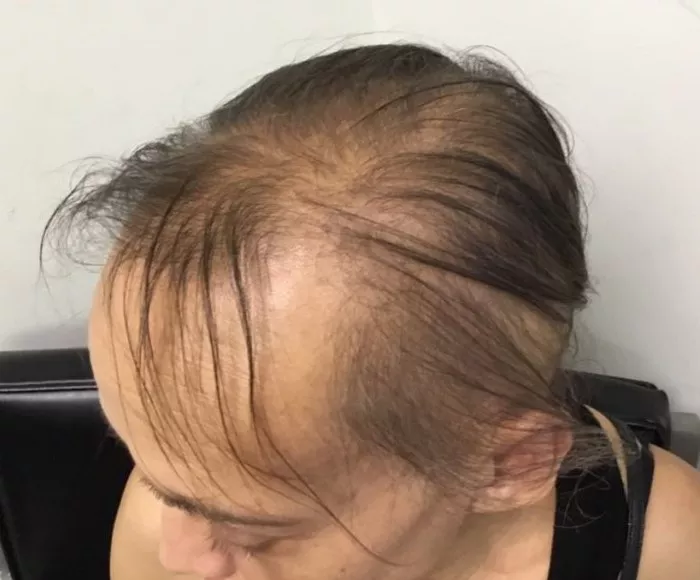Are you finding more hair on your pillow, in the shower, or clinging to your comb? Hair loss can be a distressing experience, but you’re not alone in this journey. Countless individuals face the challenge of diffuse hair loss, and the good news is that there are steps you can take to address it effectively. In this comprehensive guide, we’ll explore the underlying causes of diffuse hair loss and provide you with actionable strategies to put a halt to this concern.
Understanding Hair Loss: The Basics
Hair loss is a natural part of the hair growth cycle. Understanding this cycle is crucial to comprehend why hair loss occurs. The cycle involves three phases: anagen (growth), catagen (transition), and telogen (resting). Hair loss often becomes noticeable during the telogen phase when hair sheds and makes way for new growth. Not all hair loss is the same. Diffuse hair loss, in particular, involves a widespread thinning of the hair across the scalp. It can be caused by a variety of factors, such as hormonal changes, nutritional deficiencies, and stress.
Identifying the Causes of Diffuse Hair Loss
The following are the causes of diffuse hair loss:
1. Hormonal Imbalances:
Hormones play a significant role in hair health. Conditions such as polycystic ovary syndrome (PCOS) and thyroid disorders can lead to hormonal imbalances that contribute to hair loss.
2. Nutritional Deficiencies:
Your hair requires a range of nutrients to thrive. Deficiencies in vitamins like Biotin (Vitamin B7), Vitamin D, and minerals like Iron can weaken hair follicles and lead to increased shedding.
3. Stress and Lifestyle Factors:
Stress has a more profound impact on our bodies than we often realize. Chronic stress can push hair follicles into the telogen phase, causing excess hair shedding. Additionally, poor lifestyle choices like smoking and an unbalanced diet can exacerbate hair loss.
4. Medical Conditions:
Certain medical conditions, such as alopecia areata, can cause diffuse hair loss. These conditions are often autoimmune in nature and require specific treatments.
Effective Strategies to Combat Diffuse Hair Loss
Here are solutions to combat diffuse hair loss:
1. Balanced Diet:
A diet rich in vitamins and minerals is essential for healthy hair. Incorporate leafy greens, eggs, nuts, and seeds to ensure you’re getting the necessary nutrients.
2. Supplements:
In cases of nutritional deficiencies, supplements can play a supportive role. Consult with a healthcare professional before adding any supplements to your routine.
3. Hair Care Routine:
Be gentle with your hair. Avoid aggressive brushing and tight hairstyles that can stress hair shafts. Use a mild, sulfate-free shampoo and conditioner to maintain scalp health.
4. Stress Management:
Engage in stress-reducing activities such as yoga, meditation, or regular exercise. These practices can help regulate hormonal balance and minimize hair loss.
5. Medical Consultation:
If you suspect an underlying medical condition is causing your hair loss, consult a medical professional. They can provide a proper diagnosis and recommend appropriate treatments.
Promising Treatment Options
Here are some medications and treatments to help you deal with hair loss:
1. Topical Treatments:
Over-the-counter topical treatments containing minoxidil can stimulate hair growth and slow down hair loss progression.
2. Prescription Medications:
Some prescription medications, such as finasteride, are approved for treating hair loss in certain cases. However, these medications should be used under medical supervision due to potential side effects.
3. Platelet-Rich Plasma (PRP) Therapy:
PRP therapy involves injecting your blood’s concentrated platelets into the scalp to stimulate hair growth. It’s a minimally invasive procedure with growing popularity.
The Road to Hair Restoration: Patience and Persistence
It’s important to note that addressing diffuse hair loss takes time. Hair growth is a gradual process, and results from treatments may vary. Be patient and consistent in your chosen strategies, and don’t hesitate to seek professional guidance if needed.
See Also: The Solutions of Stopping Hair Loss from Synthroid
In Conclusion
Diffuse hair loss can be a daunting challenge, but armed with the right information and strategies, you can take control of your hair health. By understanding the underlying causes, adopting a holistic approach to lifestyle and nutrition, and considering medical interventions when necessary, you can pave the way for healthier, fuller hair. Remember, each individual’s journey is unique, so tailor your approach to what works best for you.


